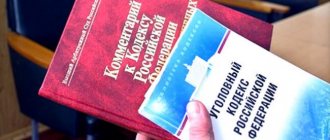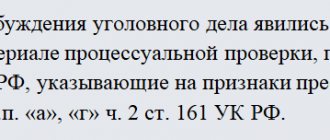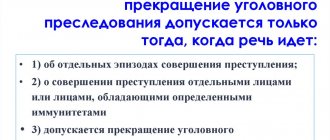Commentary on Article 24 of the Code of Criminal Procedure of the Russian Federation
1. The article contains a list of grounds, in the presence of which, a refusal to initiate a criminal case is issued, if these grounds are established at the stage of initiating a criminal case, or a resolution (ruling) to terminate a criminal case or criminal prosecution, if the grounds are established at subsequent stages of criminal proceedings .
2. In accordance with paragraph 1 of part 1 of the commented article, a criminal case cannot be initiated, and the one initiated is terminated due to the absence of a crime. The event of a crime is included in the list of circumstances subject to proof in each criminal case (clause 1, part 1, article 73 of the Code of Criminal Procedure of the Russian Federation). The absence of a crime event means that the act that was reported as a crime did not actually occur. For example, this may occur in the following cases: a) when a report of theft was received, but the item was accidentally lost and subsequently found; b) property was damaged or a person was injured as a result of a natural disaster; c) the crime was reported in error; d) there was a deliberately false denunciation of a crime.
3. When making a decision to initiate a criminal case based on the results of checking a report of a crime related to the suspicion of its commission by a specific person or persons, the investigator, the body of inquiry are obliged to consider the issue of initiating a criminal case for knowingly false denunciation against the person who declared or disseminated the false reporting a crime (part 2 of article 148 of the Code of Criminal Procedure of the Russian Federation).
4. The absence of corpus delicti in an act (clause 2 of part 1 of the commented article) occurs in cases where the event itself took place, but it is not a crime.
A crime according to Part 1 of Art. 14 of the Code of Criminal Procedure of the Russian Federation recognizes a socially dangerous act committed as guilty, prohibited by this Code under threat of punishment. For an act to contain a crime, the following elements must be present: the object of the crime; the objective side of the crime; subject of the crime; subjective side of the crime.
The object of the crime is social relations that are violated when committing a particular act. The objective side of a crime is the actions (inactions) that represent human behavior that led to a criminal result. The subject of a crime is a person who has certain characteristics in connection with which he may be held criminally liable for the act committed. The subjective side of a crime is the internal attitude of a person to the act he has committed, characterized by the presence of guilt.
To issue a decision to refuse to initiate a criminal case or a decision (ruling) to terminate a criminal case on the basis of clause 2 of part 1 of Art. 24 of the Code of Criminal Procedure of the Russian Federation, it is enough that the act lacks at least one of the above elements of the crime.
If, despite the absence of corpus delicti in the act, the court renders a guilty verdict, it is subject to cancellation by a higher court, and the criminal case is terminated.
5. According to paragraph 3 of part 1 of the commented article, one of the grounds for refusal to initiate a criminal case (termination of a criminal case, criminal prosecution) is the expiration of the statute of limitations.
The statute of limitations under the Criminal Code of the Russian Federation varies depending on the severity of the crime committed. In Art. 78 of this act establishes that a person is released from criminal liability if the following periods have expired from the date of commission of the crime: a) two years after the commission of a crime of minor gravity; b) six years after committing a crime of average gravity; c) ten years after the commission of a serious crime; d) fifteen years after the commission of a particularly serious crime. The statute of limitations is calculated from the day the crime was committed until the court verdict enters into legal force. If a person commits a new crime, the statute of limitations for each act is calculated independently. The running of the statute of limitations is suspended if the person who committed the crime evades the preliminary investigation or trial. In this case, the running of the limitation period is resumed from the moment of detention of the specified person or his surrender. The issue of applying the statute of limitations to a person who has committed a crime punishable by the death penalty or life imprisonment is resolved by the court. If the court does not consider it possible to release the specified person from criminal liability due to the expiration of the statute of limitations, then the death penalty and life imprisonment are not applied.
Statutes of limitation do not apply to persons who have committed a number of crimes, and persons are subject to criminal liability in the general manner. Such crimes include acts provided for in the following articles of the Criminal Code of the Russian Federation: 260 “Terrorist act”; 205.1 “Promotion of terrorist activities”; 205.3 “Training for the purpose of carrying out terrorist activities”; 205.4 “Organization of a terrorist community and participation in it”; 205.5 “Organization of the activities of a terrorist organization and participation in the activities of such an organization”; 206 (parts 3 and 4) “Hostage taking”; 211 (part 4) “Hijacking of an air or water transport vessel or railway rolling stock”; 353 “Planning, preparation, initiation or waging of aggressive war”; 356 “Use of prohibited means and methods of warfare”; 357 “Genocide”; 358 "Ecocide"; 361 “Act of international terrorism.” Also, a number of crimes do not have a statute of limitations if they were associated with terrorist activities. These include acts specified in the following articles of the Criminal Code of the Russian Federation: 277 “Encroachment on the life of a statesman or public figure”; 278 “Forcible seizure of power or forcible retention of power”; 279 “Armed rebellion”; 360 “Attack against persons or institutions enjoying international protection.”
6. There are certain features of the application of statutes of limitations to ongoing and ongoing crimes. According to the resolution of the 23rd Plenum of the Supreme Court of the USSR dated March 4, 1929 “On the conditions for the application of limitation and amnesty to ongoing and ongoing crimes,” ongoing crimes are characterized by the continuous implementation of a certain act. A continuing crime begins with some criminal act or an act of criminal omission. Therefore, a continuing crime can be defined as an act or omission accompanied by a subsequent long-term failure to fulfill the duties imposed on the offender by law under threat of criminal punishment. Very similar to continuing crimes are continuing crimes, which consist of a number of identical criminal actions aimed at a common goal and collectively constituting a single crime. These crimes, for example, include torture, which is expressed in systematic beatings.
A continuing crime begins from the moment of commission of a criminal act (inaction) and ends as a result of the actions of the culprit himself, aimed at stopping the crime, or upon the occurrence of events that prevented the further continuation of the crime (for example, intervention by authorities).
The statute of limitations for criminal prosecution in relation to ongoing crimes is calculated from the time of their termination at the will or against the will of the perpetrator (voluntary performance by the perpetrator of his duties, confession, detention, etc.).
The beginning of a continuing crime should be considered the commission of the first action from among several identical actions that constitute one continuing crime, and the end is the moment of commission of the last criminal act. The statute of limitations for continuing acts is calculated from the moment of commission of the last criminal act that constitutes a continuing crime.
7. As a general rule, a person cannot be brought to criminal liability if the time limit established by law has expired from the day the crime was committed. At the same time, according to Part 2 of Art. 27 of the Code of Criminal Procedure of the Russian Federation, termination of a criminal case due to the expiration of the statute of limitations for criminal prosecution is not allowed if the accused objects to this. If the court finds the defendant guilty, then it pronounces a guilty verdict without imposing punishment (clause 3, part 5, article 302 of the Code of Criminal Procedure of the Russian Federation).
8. If the statute of limitations has expired since the commission of the act, consent must be obtained from the interested person to refuse to initiate criminal proceedings against him. If consent is not obtained, then a criminal case must be initiated, after which proceedings are carried out in the usual manner.
9. Termination of a criminal case is not allowed if the suspect or accused objects to this.
10. If the statute of limitations for criminal prosecution expires before the sentence enters into legal force, the convicted person is subject to release from punishment.
11. In paragraph 4 of part 1 of the commented article, it is established that one of the grounds for refusal to initiate a criminal case or termination of a criminal case is the death of the suspect or accused, except in cases where criminal proceedings are necessary for the rehabilitation of the deceased.
12. The death of a suspect or accused, with the exception of cases where criminal proceedings are necessary for the rehabilitation of the deceased, is the only basis for refusing to initiate a criminal case and for terminating a criminal case. At the same time, the legitimate interests of close relatives of the deceased are essentially the same both in the case of a decision to refuse to initiate a criminal case and in the case of termination of a criminal case, just as in both cases the state’s obligation to ensure judicial protection of honor must be observed, dignity and good name of the deceased person.
Accordingly, at the stage of initiating a criminal case, when only the question of the reasons and grounds for this procedural decision is being resolved, namely the availability of sufficient data indicating the signs of a crime, carrying out the entire range of investigative actions to collect, verify and evaluate evidence of a person’s guilt in committing it It is not possible, and therefore unacceptable, to issue a decision to refuse to initiate a criminal case in connection with the death of a suspect without giving close relatives of the deceased the right to seek his possible rehabilitation.
13. Termination of a criminal case on this basis is possible only if at the time of the death of a person he had the status of a suspect or accused in this criminal case. The issuance of such a decision does not indicate the guilt of the person in committing a crime, although it does not cause rehabilitation on the grounds and in the manner provided for in Chapter. 18 Code of Criminal Procedure of the Russian Federation.
14. In accordance with clause 4, part 1, art. 24 of the Code of Criminal Procedure of the Russian Federation, the death of a suspect or accused is an unconditional basis for termination of a criminal case, and within the meaning of the law, a criminal case against a deceased person can be terminated at any stage of the process.
Thus, in the event of the death of a convicted person before the verdict enters into legal force, the appellate court is obliged to overturn the conviction and terminate the proceedings on the basis of clause 4, part 1 of the commented article, except for cases where the criminal proceedings are necessary for the rehabilitation of the deceased.
15. If close relatives (clause 4 of article 5), relatives (clause 37 of article 5) or close persons (clause 3 of article 5 of the Code of Criminal Procedure of the Russian Federation) object to the termination of the criminal case on this basis and insist on the rehabilitation of the deceased, then the criminal proceedings are carried out in the usual manner. If subsequently these persons are convinced that the crime was actually committed by the deceased, then they have the right to file a petition to terminate the criminal case, which is subject to mandatory satisfaction.
16. Having found the deceased guilty of committing a crime, the court pronounces a guilty verdict without imposing punishment (clause 3, part 5, article 302 of the Code of Criminal Procedure of the Russian Federation).
17. The death of a person against whom criminal prosecution was carried out must be established reliably. Therefore, the decision to terminate criminal proceedings based on assumptions must be canceled.
18. A criminal case in accordance with paragraph 5 of part 1 of the commented article is not initiated in the absence of a statement from the victim, if the case cannot be initiated otherwise than at his request, with the exception of cases provided for in part 4 of Art. 20 Code of Criminal Procedure of the Russian Federation.
The current legislation establishes that only upon the application of the victim, criminal cases of private and private-public prosecution are initiated (parts 2 and 3 of Article 20 of the Code of Criminal Procedure of the Russian Federation). If such a criminal case was initiated in the absence of a statement from the victim, then it is subject to immediate termination. The exception is cases when an investigator or, with the consent of the prosecutor, an interrogating officer initiates a criminal case and in the absence of a statement from the victim, if the crime was committed against a person who is in a dependent state or for other reasons is not able to independently exercise his rights (see Part 4 of Art. 20 Code of Criminal Procedure of the Russian Federation).
19. In paragraph 6 of part 1 of the commented article it is established that the basis for refusal to initiate a criminal case or termination of a criminal case are cases when there is no court conclusion on the presence of signs of a crime or consent to initiate a criminal case against one of the persons against whom criminal proceedings are carried out in a special manner, or to involve such a person as an accused.
The list of such persons is contained in Art. 448 Code of Criminal Procedure of the Russian Federation. The specified procedure applies to the initiation of criminal cases against these persons or to bring them as accused. This rule arose due to the fact that a criminal case can be initiated both against a specific person, in connection with which he is given the status of a suspect, and based on the fact of an act committed (Article 146 of the Code of Criminal Procedure of the Russian Federation). In the second case, the procedure established by paragraph 6 of part 1 of the commented article concerns the prosecution of a person as an accused.
If a person objects to the termination of a criminal case on this basis, then the proceedings on it in accordance with Part 2 of Art. 27 of the Code of Criminal Procedure of the Russian Federation continues as usual.
20. Part 2 of the commented article establishes that a criminal case is subject to termination due to the lack of elements of representation in the act in the case when, before the verdict entered into legal force, the crime and punishability of this act were eliminated by a new criminal law. This provision provides the possibility of rehabilitation of a person suspected or accused of committing a crime if this act was subsequently decriminalized.
From the content of the commented norm it follows that a criminal case is terminated in the case when the criminal law is put into effect before the court’s conviction comes into force.
21. If a criminal law was put into effect during the preliminary investigation, then the criminal case is subject to termination in the manner established by Chapter. 29; if during the trial in the court of first instance - Art. 254; if during appeal proceedings - in the manner established by Art. 389.20 Code of Criminal Procedure of the Russian Federation.
If a new criminal law was adopted after the verdict came into force, this fact is a new circumstance and entails the resumption of proceedings on the basis of clause 3 of part 4 of art. 413 Code of Criminal Procedure of the Russian Federation.
22. Part 3 of the commented article establishes that the termination of a criminal case simultaneously entails the termination of criminal prosecution.
The concepts of “termination of a criminal case” and “termination of criminal prosecution” have different meanings.
In accordance with paragraph 55 of Art. 5 of the Code of Criminal Procedure of the Russian Federation, criminal prosecution is a procedural activity carried out by the prosecution in order to expose a suspect accused of committing a crime.
Termination of a criminal case occurs in cases where the criminal proceedings as a whole are liquidated, including the criminal prosecution of a specific person. At the same time, all criminal procedural relations that arose in connection with a specific crime event are considered exhausted. In cases where criminal prosecution is terminated, the fact of the crime itself is not called into question. The decision to terminate criminal prosecution concerns a specific person against whom criminal proceedings are being conducted. When criminal prosecution against a person is terminated, the criminal case as a whole is terminated only in cases where a criminal case was initiated against this person. If the event of a crime is inextricably linked with the person who committed it (for example, Article 313 of the Criminal Code of the Russian Federation provides for liability for escaping from a place of imprisonment, from arrest or from custody), then the termination of criminal prosecution entails the termination of the criminal case as a whole.
23. Part 4 of the commented article, which defines the rules for terminating a criminal case and criminal prosecution in the presence of accomplices, specifies the content of the previous part.
In the commented norm, in particular, it is established that upon termination of a criminal case against all suspects and accused, the criminal case is also subject to termination. The exception is the cases reflected in Part 1 of Art. 27 of the Code of Criminal Procedure of the Russian Federation, since when establishing the non-involvement of all suspects and accused in committing a crime, the very fact of the crime may take place. In such situations, after the termination of criminal prosecution, further criminal proceedings continue as usual.
UrDela.ru
Part 1. A criminal case cannot be instituted, and an instituted criminal case is subject to termination on the following grounds:
1) absence of crime event;
2) absence of corpus delicti in the act;
3) expiration of the statute of limitations for criminal prosecution;
4) death of a suspect or accused, except for cases where criminal proceedings are necessary for the rehabilitation of the deceased;
5) absence of a statement from the victim, if a criminal case can be initiated only at his request, except for the cases provided for in part four of Article 20 of this Code;
6) the absence of a court conclusion on the presence of signs of a crime in the actions of one of the persons specified in paragraphs 2 and 2.1 of part one of Article 448 of this Code, or the absence of consent, respectively, of the Federation Council, the State Duma, the Constitutional Court of the Russian Federation, the qualification board of judges to initiate a criminal case or attract as the accused one of the persons specified in paragraphs 1 and 3 - 5 of part one of Article 448 of this Code.
(as amended by Federal Laws dated May 29, 2002 N 58-FZ, dated July 18, 2009 N 176-FZ)
Part two of Article 24 in its constitutional and legal interpretation, arising from the rulings of the Constitutional Court of the Russian Federation that remain in force, does not prevent the court from considering the merits of a criminal case pending before it, if, before passing a sentence, the criminality and punishability of the act charged to the accused is eliminated by a new criminal law, and does not deprive the accused of the right of access to justice and the right to effective judicial protection in the procedural forms established by law (Determination of the Constitutional Court of the Russian Federation of November 5, 2004 N 361-O).
Part 2. A criminal case is subject to termination on the grounds provided for in paragraph 2 of part one of this article, in the case where, before the verdict entered into legal force, the crime and punishability of this act were eliminated by a new criminal law.
Part 3. Termination of a criminal case entails the simultaneous termination of criminal prosecution.
Part 4. The criminal case is subject to termination if the criminal prosecution against all suspects or accused is terminated, with the exception of the cases provided for in paragraph 1 of part one of Article 27 of this Code.
(Part four was introduced by Federal Law No. 92-FZ of 04.07.2003)
‹ Chapter 4. (Code of Criminal Procedure of the Russian Federation). GROUNDS FOR REFUSAL TO INSTITUTE A CRIMINAL CASE, TERMINATION OF A CRIMINAL CASE AND CRIMINAL PROSECUTION Up Article 25 (Code of Criminal Procedure of the Russian Federation). Termination of a criminal case due to reconciliation of the parties ›








